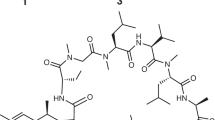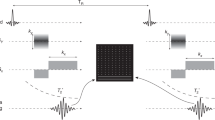Abstract
NUCLEAR quadrupole resonance (n.q.r.) in solids can be effectively examined1 with a super-regenerative spectrometer, which may be operated2 in the self-quenching mode or may be externally quenched.
This is a preview of subscription content, access via your institution
Access options
Subscribe to this journal
Receive 51 print issues and online access
$199.00 per year
only $3.90 per issue
Buy this article
- Purchase on Springer Link
- Instant access to full article PDF
Prices may be subject to local taxes which are calculated during checkout
Similar content being viewed by others
References
Das, T. P., and Hahn, E. L., Solid State Physics Suppl., Chap. 2 (Academic Press, New York and London, 1958).
Whitehead, J. R., Super-regenerative Receivers (Cambridge University Press, 1950).
Bogaard, M. J., Hacobian, S., Hay, W., and Sullivan, E. P. A., Austral. J. Chem., 17, 611 (1964).
Terman, F. E., Electronic and Radio Engineering, 662 (McGraw Hill Co., New York and London, 1955).
Author information
Authors and Affiliations
Rights and permissions
About this article
Cite this article
SULLIVAN, E. Nuclear Resonance: Simple Method of Detection. Nature 218, 944–945 (1968). https://doi.org/10.1038/218944a0
Received:
Issue Date:
DOI: https://doi.org/10.1038/218944a0
This article is cited by
Comments
By submitting a comment you agree to abide by our Terms and Community Guidelines. If you find something abusive or that does not comply with our terms or guidelines please flag it as inappropriate.



